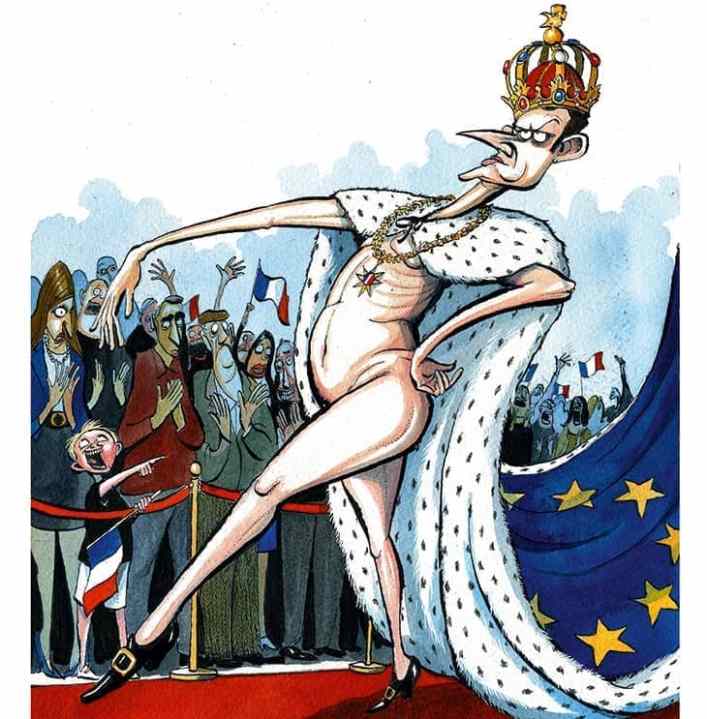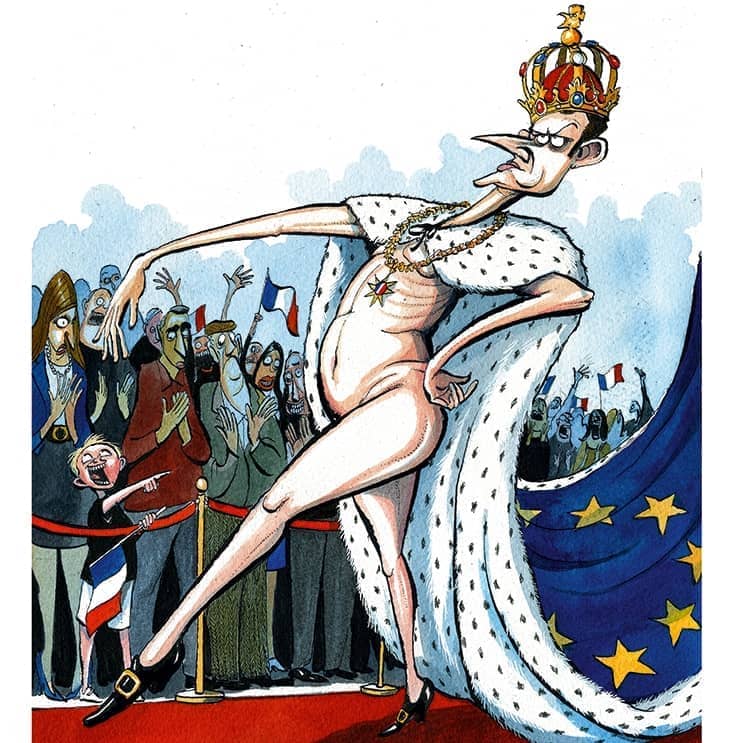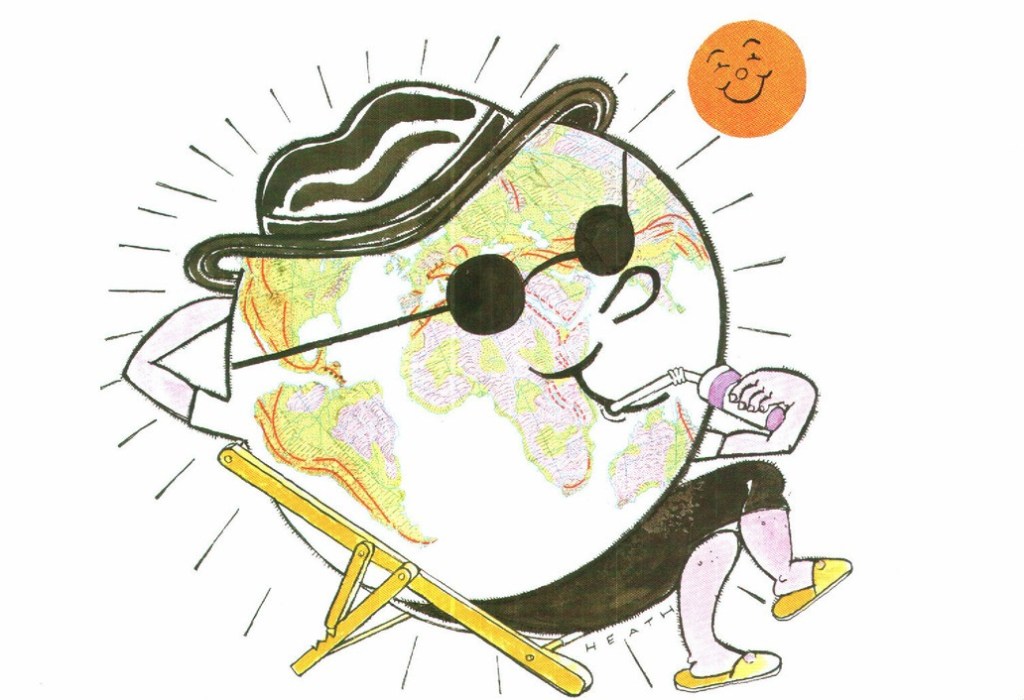‘Maoré na Farantsa paka tcho!’, Emmanuel Macron declared five years ago campaigning in Mamoudzou, speaking the local language of Shimaoré in the capital city of Mayotte, a French-ruled archipelago-commune in the Indian Ocean. Translation: Mayotte and France, for ever, in life until death. The French president returned to the islands this week to play emperor but his empire looks like it’s falling apart.
Even by the standard of Macron’s habitual wishful thinking, Mayotte is a disaster. Like much of the French empire – an empire that pretends not to be one – Macron indulges a fantasy that its remote colonies are really just part of France itself. Racked with riots, crime and poverty, the latest problem in Mayotte is a flux of African refugees hated by the locals.
Few French people could find Mayotte on a map and its economic contribution to the country is negative. Other than conceit, it’s incomprehensible why France insists on keeping its tricolor flying here. Like much of la France d’outre mer, it’s a bottomless pit into which the French pour subsidies for benefits that seem minimal.
Even by the standard of Macron’s habitual wishful thinking, Mayotte is a disaster
Mayotte is but one of France’s problems in the Indian Ocean. The much larger island of Réunion has been a recurrent source of chaos over the past few decades: with an unemployment crisis, regular riots and an outbreak of chikungunya, a paralysing disease.
Macron didn’t hang around in Mayotte this week and dodged Réunion altogether. After promising a new runway for the Mayotte airport, a promise made and broken by successive French governments for 20 years, he jetted off in the presidential Airbus to New Caledonia, another French outpost off the coast of Australia, where seven people, including two gendarmes, have been killed in ethnic riots this month and there’s a growing independence movement. With the territory said by some to be on the verge of civil war, the French have been forced to deploy soldiers to defend the port, airport and government buildings. Businesses have been destroyed by arson. Macron arrived on Thursday morning and declared he was there to open a dialogue.
Macron condemned the ‘absolutely unprecedented insurrection movement’ that has been shaking New Caledonia since mid-May. ‘No one has this level of organisation and violence’, he added, visiting a police station in the centre of the capital of Nouméa, where he praised ‘sang froid’ and ‘the professionalism’ of the police and gendarmes deployed on the ground.
‘The days and weeks that come will be difficult’, he added.
‘We have to hold on. There is no appeasement as long as there is this violence,’ he declared.
Not everyone is convinced. Australia and New Zealand have started evacuating their nationals.
A tour d’horizon of France’s global colonies (although we must not call them that) shows the indivisible republic melting down across the globe. French Polynesia, another French Pacific territory within the republic, is in continuous political turmoil with demands for independence. In the Caribbean, Guadaloupe and Martinique are regularly seized by riots.
Clinging onto the northeast coast of South America, French Guiana, wedged between Brazil and Surinam, with its rapacious mosquitoes and poisonous giant moths, has become a centre for drug smuggling and environmental catastrophe as illegal gold miners crossing the indefensible frontier with Brazil poison the Amazon with cyanide, overwhelming the police.
Proparco, the French overseas development agency, admits that French overseas territories are:
penalised by insularity, remoteness, the small size of domestic markets, high production costs compared to neighbouring countries, high climate change risks (cyclones, rising sea levels…), geological risks (seismic, volcanic…) and epidemiological risks (chikungunya, dengue fever…). They also have more marked economic and social weaknesses than mainland France.
Calculating the costs of this isn’t straightforward. The official auditors at the cours des comptes admit that repeated social tensions – linked in particular to employment, inequality and insecurity – underline the ‘continued, even worsening, economic and social vulnerabilities of these territories.’
Central government has tried to respond to each of these crises by implementing a number of emergency plans, and by increasing its budgetary effort.
The French empire that dares not admit it’s an empire includes departments, territories and collectivities in North and South America, the Caribbean, and the Indian and Pacific oceans but only insignificant outposts seem indubitably secure. Off the coast of Newfoundland is Saint Pierre and Miquelon, which sends its sick to Canada for treatment.
There’s Saint Barthélemy, a billionaires’ paradise in the Caribbean, but nobody pays taxes there because of a strange treaty dating to the Napoleonic war in which Sweden conceded the island in return for trading rights in the port of Gotherburg.
And there’s Wallis and Fortuna, northeast of Fiji, which although supposedly French, comprises three residual kingdoms (there were four, but those owing allegiance to the fourth were eaten by the other three).
There seems little risk of insurrection on Clipperton Island, an uninhabited coral atoll 1,280 km south of Acapulco. Although how France profits from this outpost is unclear. Oh, I nearly forgot. The French Southern and Antarctic Lands, with a population of 140, several million penguins and of course a prefect – a job that must count as the very worst civil service sinecure in France.
Macron and his predecessors have presided not only over the troubled French de jure empire but also over the collapse of its de facto empire in Africa, where France’s failed military intervention has seen former French colonies turn their back on the motherland. La Franceafrique has become a crucible for militant Islamism, from Mali to Niger to the Côte d’Ivoire.
Much of north and west Africa was under direct French rule until the 20th century when the colonial ties were dissolved, brutally in the case of Algeria. In Mali, I walked through the grand marché in the centre of Bamako where as I walked through the market there were murmurs of toubabou, toubabo (white man, white man).
On one side of the market is the Grande Mosquée. Facing it is the French-built National Assembly, resembling a suburban lycée, which is a temple to the dead religion of Malien democracy. Between the two is the fetish market, where traders sell leopard skins, monkey skulls and powerful potions, emblematic of an Africa which France foolishly imagined it could make its own.
Haiti, now under the control of gangsters, is yet another failed former French colony, with a legacy of brutal slavery, re-imposed by Napoleon III after the failed revolution of Toussaint Louverture.
That the sun seems finally to be setting on the remaining French empire seems clear to everyone except the French. The indivisible republic is falling apart.









Comments